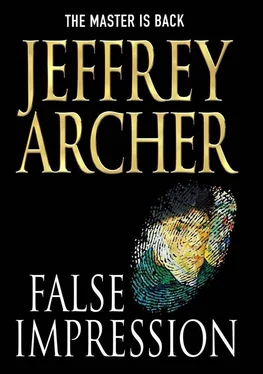“You got here quickly,” said one of the guards, but Jack didn’t comment as he headed for the bank of elevators. The guard wondered how he knew which floor to go to.
Jack squeezed through the elevator doors just as they were about to close and jabbed at the button marked 32. When the doors opened again, he looked quickly up and down the corridor to see where the lights were coming from. He turned and ran toward some offices at the far end to find a security guard and two engineers in red overalls, along with a cleaner, standing by an open door.
“Who are you?” demanded the security guard.
“FBI,” said Jack, producing his badge but not revealing his name as he strode into the room. The first thing he saw was a blown-up photograph of Fenston shaking hands with George W. Bush, which dominated the wall behind the desk. His eyes moved quickly around the room until they settled on the one thing he was looking for. It was in the center of the desk, resting on a pile of spread-out papers beside an open file.
“What happened?” demanded Jack authoritatively.
“Some guy got himself trapped in this office for over three hours and must have set the alarm off.”
“It wasn’t our fault,” jumped in one of the engineers, “we were told to downgrade the call, and we’ve got that in writing, otherwise we would have been here a lot sooner.”
Jack didn’t need to ask who had set off the alarm and then left Leapman to his fate. He walked over to the desk, his eyes quickly scanning the papers. He glanced up to find all four men staring at him. Jack looked directly at the security guard. “Go to the elevator, wait for the cops, and the minute they turn up bring them straight back to me.” The guard disappeared into the corridor without question and headed quickly toward the elevators. “And you three, out,” was Jack’s next command. “This may be a crime scene, and I don’t want you disturbing any evidence.” The men turned to leave, and in the split second their backs were turned, Jack grabbed the camera and dropped it into one of the baggy pockets of his trench coat.
He picked up the phone on Fenston’s desk. There was no dial tone, only a continuous buzzing noise. Someone had disconnected the line. The same person who triggered the alarm, no doubt. Jack didn’t touch anything else in the room. He stepped back into the corridor and slipped into the adjoining office. A screen was fixed to the corner of the desk and was still relaying images from inside Fenston’s office. Fenston had clearly not only witnessed Leapman’s actions but had enough time to set in motion the most diabolical revenge.
Jack’s eyes moved across to the switchboard. One lever was up, illuminating a flickering orange light, indicating that the line was busy. He must have cut Leapman off from any hope of contacting the outside world. Jack looked down at the desk where Fenston would have been sitting when he planned the whole operation. He’d even written out a list to make sure he didn’t make a mistake. All the clues were there for the NYPD to gather and evaluate. If this had been a Columbo investigation, the switch, the handwritten list left on the desk, and the timing of the alarm going off would have been quite enough for the great detective to secure a conviction, with Fenston breaking down and confessing following the last commercial break. Unfortunately, this wasn’t a made-for-TV movie, and one thing was certain: Fenston wasn’t going to break down and would never consider confessing. Jack grimaced. The only thing he had in common with Columbo was the crumpled raincoat.
Jack heard the elevator doors open and the words, “Follow me.” He knew it had to be the cops. He turned his attention back to the screen on the desk as two uniformed officers marched into Fenston’s office and began to question the four witnesses. The plainclothes men wouldn’t be far behind. Jack walked out of the adjoining office and headed silently toward the elevator. He’d reached the doors when one of the cops came out of Fenston’s office and shouted, “Hey, you.” Jack jabbed at the down button and turned sideways, so the officer couldn’t see his face. The moment the doors opened, he quickly slipped inside. He kept his finger pressed on the button marked L and the doors immediately closed. When they opened on the ground floor thirty seconds later, he jogged past reception, out of the building, down the steps, and headed in the direction of his car.
Jack jumped in and started the engine, just as a cop came running around the corner. He swung the car in a circle, mounted the sidewalk, drove back onto the road, and headed for St. Vincent’s Hospital.
“Good afternoon, Sotheby’s.”
“Lord Poltimore, please.”
“Who shall I say is calling, madam?”
“Lady Wentworth.” Arabella didn’t have to wait long before Mark came on the line.
“How nice to hear from you, Arabella,” said Mark. “Dare I ask,” he teased, “are you a buyer or a seller?”
“A seeker after advice,” replied Arabella. “But if I were to be a seller...”
Mark began to make notes as he listened to a series of questions that Arabella had obviously prepared carefully.
“In the days when I was a dealer,” Mark replied, “before I joined Sotheby’s, the standard commission was 10 percent up to the first million. If the painting was likely to fetch more than a million, I used to negotiate a fee with the seller.”
“And what fee would you have negotiated, had I asked you to sell the Wentworth Van Gogh?”
Mark was glad Arabella couldn’t see the expression on his face. Once he’d recovered, he took his time before suggesting a figure, but quickly added, “If you were to allow Sotheby’s to put the picture up for auction, we would charge you nothing, Arabella, guaranteeing you the full hammer price.”
“So how do you make a profit?” asked Arabella.
“We charge a buyer’s premium,” explained Mark.
“I already have a buyer,” said Arabella, “but thank you for the advice.”
Krantz turned the corner of the street, relieved to find the pavement so crowded. She walked for about another hundred yards before stopping outside a small hotel. She glanced up and down the road, confident that she was not being followed.
She pulled open the swing doors that led into the hotel and, looking straight ahead, walked past reception, ignoring the concierge, who was talking to a tourist who sounded as if he might come from New York. Her gaze remained focused on a wall of deposit boxes to the left of the reception desk. Krantz waited until all three receptionists were fully occupied before she moved.
She glanced behind her to make sure no one had the same purpose in mind. Satisfied, she moved quickly, extracting a key from her hip pocket as she reached box 19. She turned the key in the lock and opened the door. Everything was exactly as she had left it. Krantz removed all the notes and two passports, and stuffed them in a pocket. She then locked the door, walked out of the hotel and was back on Herzen Street without having spoken to anyone.
She hailed a taxi, something she couldn’t have done in the days when the communists were teaching her her trade. She gave the driver the name of a bank in Cheryomushki, sat in the back, and thought about Colonel Sergei Slatinaru — but only for a moment. Her one regret was that she hadn’t succeeded in cutting off his left ear. Krantz would like to have sent Petrescu a little memento of her visit to Romania. Still, what she had in mind for Petrescu would more than make up for the disappointment.
But first she had to concentrate on getting out of Russia. It might have been easy to escape from those amateurs in Bucharest, but it was going to be far more difficult finding a safe route into England. Islands always cause a problem; mountains are so much easier to cross than water. She’d arrived in the Russian capital earlier that morning exhausted, having been constantly on the move since discharging herself from the hospital.
Читать дальше












